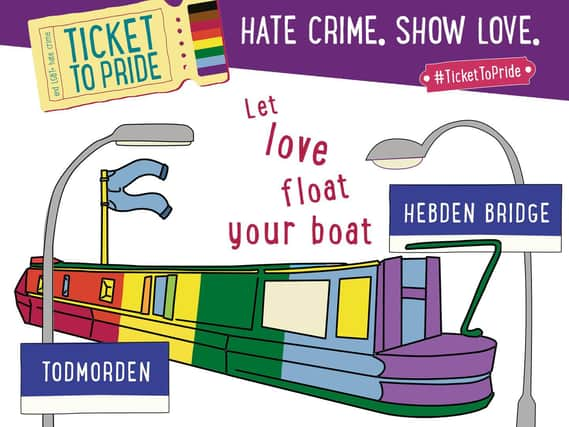Hebden Bridge Railway Station joins campaign to ‘show love’


However, with all but essential travel banned due to coronavirus, the charity behind the ‘Ticket to Pride’ campaign is now sharing the artwork online and on social media, alongside information about how to report online hate crime and access support during the pandemic.
Organisers are also calling for people from the local area to share their local LGBT+ knowledge and history using the hashtag #TicketToPride. The information shared will create LGBT+ map of positivity and bring isolated communities together during the pandemic.
Advertisement
Hide AdAdvertisement
Hide AdThe Ticket to Pride campaign has taken months of planning and the posters on display are bespoke to each train station. 15 stations across the North, including Hebden Bridge and Todmorden, will display similar artworks - each incorporating the cultural influences of the location.
Hebden Bridge’s posters feature a colourful celebration of the historical canalways and also highlights the LGBT+ heritage of a town which was once dubbed the ‘lesbian capital of the UK’.
There are around 14,400 LGBT+ people in the wider Calderdale district and every year Happy Valley Pride is a key calendar date, celebrating LGBT+ life in the region.
The posters were produced by local LGBT+ youth groups in partnership with England’s largest LGBT+ youth charity, The Proud Trust.
Advertisement
Hide AdAdvertisement
Hide AdSally Carr MBE, operational director of The Proud Trust said: “Our Ticket to Pride campaign has been months in the making and was set to launch with a series of high-profile events, sharing artwork and music created by LGBT+ young people.
"However, with the majority of us not being able to travel by train and public gatherings on hold, we had to find a different way to reach people. With the hope of spreading some joy and love among our communities at this difficult time, we’ve taken the campaign online.
“Hate crime on the transport systems is a problem among the LGBT+ community, but we also know that even before the pandemic one in 10 LGBT+ people (10 per cent) and 26 per cent of trans people would have experienced homophobic, biphobic or transphobic abuse online.
"Covid-19 is likely to have many impacts on politically marginalised groups. People are likely to be more isolated, support services are less available and losing funding, and, as anxiety around the pandemic's impact on health and the economy grows, equality slips down the political agenda. We know that child abuse, domestic violence and LGBTphobia in the home and online are all increased during this period. All of this, combined with how people are spending more time online, makes our digital work all the more vital.”